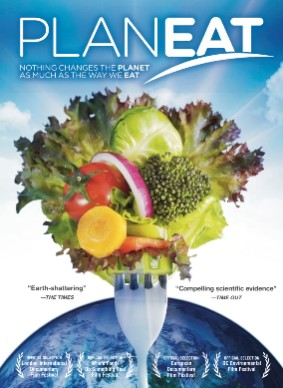‘Planeat’ reminds us of something crucial: Eat your vegetables!

When a DVD includes plant-based recipes, you know you’re in for something different. Planeat, the new British documentary that looks at the link between diet and diseases, proves to be an engaging exploration of what really happens when we eat a hamburger. Bringing together a few dominant voices in the nutritional science field, the film is able to make a convincing argument that certain types of diseases (mostly heart disease) are best defended by a thoughtful diet that cuts out animal and dairy products.
The look of the 72-minute documentary is beautiful. Seeing America’s farmlands put to sustainable use is an image everyone should experience. Perhaps it speaks to our culture that a pastoral scene of colorful vegetables and vibrant plant life looks as foreign to us as the constellations in space. We, as a nation, know that our eating habits are atrocious. Forget about the processed fast food. Forget about the oils and butter. Just think of the cholesterol, fats and sugars. Vegetables are the bane of so many people’s existence — little green things that result in shrugged shoulders and winces from adults and children alike.
But if the doctors surveyed for Planeat are right, and there’s no reason to doubt their sound scientific methods, we need to become more friendly and open to plant-based diets. A sandwich made of kale, lemons and hummus (which is expertly prepared in the documentary) shouldn’t be akin to watching a horror movie. There are abundant joys that come from the sun and the earth, and it’s up to us to find their nutritional value and enjoy it as much as possible.
We’ve heard the slogans time and time again, but hopefully a new generation is taking notes. Eating local. Eating organic. Eating food free of antibiotics. These are not luxuries. If we want to live longer, healthier lives, they need to become downright necessities.
Planeat is not perfect, mostly because it fails to completely sell its thesis before the ending credits. At only 72 minutes, there seems to be ample time to expand on the topic and gather a chorus of alternate voices. If a pure plant-based diet doesn’t sound feasible for the masses, then what can be a first step toward that utopia? Doctors T. Colin Campbell and Caldwell Esselstyn, plus Professor Gidon Eshel, are seemingly brilliant, original and productive. But they can’t be the only voices on the large spectrum of improving one’s nutrition.
What about honest farmers who rely heavily on dairy products, such as milk, yogurt and cheese? Going soy is not economically advantageous for all farmers in the United States, especially dairy farmers. If we are going to adopt this plant-based diet, is there room for a cold glass of milk? I’m probably simplifying this argument too much, but again at only 72 minutes, there are many questions that still remain.
Shelley Lee Davies and Or Shlomi, both of whom filmed, edited and directed the movie, have done a commendable job with Planeat, a movie that seems like a labor of love. They have made audience members think in different ways and reevaluate the negative aspects of their diets. This kind of change, even if it only affects a few people, is important and revelatory. Hopefully, they will make their documentary the first step in a long process to have as many people as possible think about the consequences of eating a steak, biting into a shrimp or enjoying some ice cream.
I know I have reevaluated my eating habits. Is it too dramatic to say that Planeat may have saved my life?
By John Soltes / Publisher / John@HollywoodSoapbox.com
- Planeat
- 2011
- Directed by Shelley Lee Davies and Or Shlomi
- Running time: 72 minutes (DVD also includes a 35-minute short version)
- Not Rated
- Rating:




